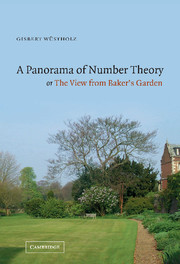Book contents
- Frontmatter
- Contents
- Contributors
- Introduction
- 1 One Century of Logarithmic Forms
- 2 Report on p-adic Logarithmic Forms
- 3 Recent Progress on Linear Forms in Elliptic Logarithms
- 4 Solving Diophantine Equations by Baker's Theory
- 5 Baker's Method and Modular Curves
- 6 Application of the André–Oort Conjecture to some Questions in Transcendence
- 7 Regular Dessins, Endomorphisms of Jacobians, and Transcendence
- 8 Maass Cusp Forms with Integer Coefficients
- 9 Modular Forms, Elliptic Curves and the ABC-Conjecture
- 10 On the Algebraic Independence of Numbers
- 11 Ideal Lattices
- 12 Integral Points and Mordell–Weil Lattices
- 13 Forty Years of Effective Results in Diophantine Theory
- 14 Points on Subvarieties of Tori
- 15 A New Application of Diophantine Approximations
- 16 Search Bounds for Diophantine Equations
- 17 Regular Systems, Ubiquity and Diophantine Approximation
- 18 Diophantine Approximation, Lattices and Flows on Homogeneous Spaces
- 19 On Linear Ternary Equations with Prime Variables – Baker's Constant and Vinogradov's Bound
- 20 Powers in Arithmetic Progression
- 21 On the Greatest Common Divisor of Two Univariate Polynomials, I
- 22 Heilbronn's Exponential Sum and Transcendence Theory
6 - Application of the André–Oort Conjecture to some Questions in Transcendence
Published online by Cambridge University Press: 20 August 2009
- Frontmatter
- Contents
- Contributors
- Introduction
- 1 One Century of Logarithmic Forms
- 2 Report on p-adic Logarithmic Forms
- 3 Recent Progress on Linear Forms in Elliptic Logarithms
- 4 Solving Diophantine Equations by Baker's Theory
- 5 Baker's Method and Modular Curves
- 6 Application of the André–Oort Conjecture to some Questions in Transcendence
- 7 Regular Dessins, Endomorphisms of Jacobians, and Transcendence
- 8 Maass Cusp Forms with Integer Coefficients
- 9 Modular Forms, Elliptic Curves and the ABC-Conjecture
- 10 On the Algebraic Independence of Numbers
- 11 Ideal Lattices
- 12 Integral Points and Mordell–Weil Lattices
- 13 Forty Years of Effective Results in Diophantine Theory
- 14 Points on Subvarieties of Tori
- 15 A New Application of Diophantine Approximations
- 16 Search Bounds for Diophantine Equations
- 17 Regular Systems, Ubiquity and Diophantine Approximation
- 18 Diophantine Approximation, Lattices and Flows on Homogeneous Spaces
- 19 On Linear Ternary Equations with Prime Variables – Baker's Constant and Vinogradov's Bound
- 20 Powers in Arithmetic Progression
- 21 On the Greatest Common Divisor of Two Univariate Polynomials, I
- 22 Heilbronn's Exponential Sum and Transcendence Theory
Summary
Abstract
We show how a problem concerning the transcendence of values of the classical hypergeometric function, and originating in work of Siegel on G-functions, can be solved using a special case of a conjecture of André–Oort on the distribution of complex multiplication (or special) points on algebraic curves in Shimura varieties. The special case in question has recently been proven, at our suggestion, by Edixhoven & Yafaev (2001); see also Yafaev (2001b). This settles the question of which classical hypergeometric functions with rational parameters, satisfying certain natural assumptions, take only finitely many algebraic values at algebraic points. The fact that such a function cannot have an arithmetic monodromy group goes back to work of Wolfart (1988). We introduce a number of related problems.
Note added in revision In the original version of this article, we introduced a number of open problems motivated by transcendence questions on the classical hypergeometric function. These are summarised in Problems 1, 2, 3 and 4 of §1. One of the main points of this article is to show how Problems 1 and 2 follow from Problem 4, which is in turn related to the André–Oort Conjecture, Oort (1997) concerning the distribution of complex multiplication points on subvarieties of Shimura varieties.
- Type
- Chapter
- Information
- A Panorama of Number Theory or The View from Baker's Garden , pp. 89 - 106Publisher: Cambridge University PressPrint publication year: 2002
- 5
- Cited by

